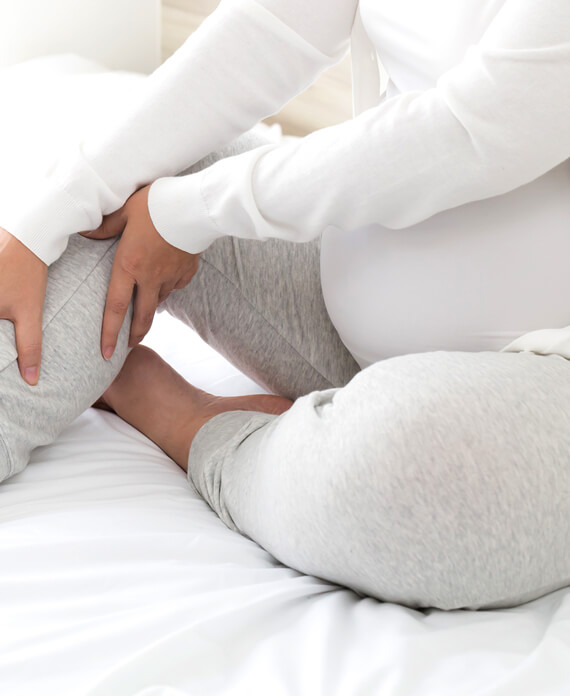
Anyone can experience the painful cramps in their calf muscles. In pregnancy, however, leg cramps are very common with about 50% of women experiencing the cramps. The cramps can happen at any time but are seen most often in the second and third trimesters of pregnancy. The cramps are mostly experienced at night.
Just what is behind these painful cramps? Is there anything that you can do to prevent them? We’ve got the answers that you are looking for.
Causes of leg cramps
in pregnancy
In truth, it can be difficult to pinpoint the precise reason for cramps when you are pregnant. Pregnancy leads to a number of changes in the body, each of which can be a contributing factor.
The contributing factors may include the following:
Changes in circulation. Circulation slows down during pregnancy, which is completely normal and is not typically cause for concern. Be sure to get up every hour or two during the day, to stretch and keep your circulation up. Elevating your legs as often as possible can help to reduce leg oedema, and improve circulation in your legs.
Weight gain. Some weight gain is expected during pregnancy. The pressure of the extra weight, combined with the added pressure of the growing little one can take a toll on your muscles, blood vessels and nerves. Keeping your weight gain healthy and staying active may help to keep leg cramps under control.
Dehydration. Dehydration can potentially result in leg cramps. Be aware of some of the signs of dehydration, including change in urine colour. Drinking plenty of water throughout the day and into the evening. Upping your water intake is one of the easiest ways to address leg cramps.
Magnesium and calcium deficiency. Lowered levels of potassium and calcium have also been suggested as possible causes of pregnancy leg cramps, although research results have been conflicting and inconclusive.
Preventing leg
cramps
While it can be hard to pinpoint the reasons behind the leg cramps that you are experiencing, there are some steps that you can take to minimise your potential for nocturnal leg cramping.
- Stretching your calf muscles all day and right before bed.
- Stay hydrated.
- Stay active, with pregnancy-safe workouts that include swimming, walking and prenatal yoga.
- Apply heat to aching or cramping muscles.
- Avoid standing too long, or sitting with crossed legs.
- Elevate your legs as much as possible.
Pregnancy Leg Cramps
FAQ
Here at O&GCG Melbourne we know how painful leg cramps can be, and we have some answers to the questions that we hear most often from our patients.
When can I expect leg cramps to start?
Leg muscles can cramp at any time, but nocturnal cramps typically start in your second or third trimester.
How much water should I be drinking?
This will vary for each individual, but as a general rule you should be drinking between eight to 10 glasses of water a day. If you have been more active or living in hot weather/climate, then you will need to increase your intake appropriately. You should not replace water intake with caffeinated or sugary drinks.
How long should cramps last?
Really bad leg cramps can result in discomfort and pain for a few days. The cramp itself should ease up within a minute or two. If the cramp does not subside and is accompanied by swelling or redness in the same area, this may be indicative of a more serious concern. Please call to be seen.
Will I get leg cramps for my entire pregnancy?
Leg cramps are very common during pregnancy, particularly in the second-half of pregnancy. Unfortunately for women who are prone to leg cramps, they can be recurring. The good news is some of the simple measures listed above can help to prevent leg cramps.
Are leg cramps dangerous?
No. Leg cramps are a very common occurrence in pregnancy. They can be very painful, but they are not considered to be dangerous unless there is a serious underlying reason for them. If you are dehydrated, this could potentially lead to further concerns. If your calf muscles
Are there any supplements that can help?
It’s important to consult with your doctor or midwife prior to taking any additional supplements when you are pregnant. Prenatal vitamins that contain magnesium and calcium may be beneficial.
Will a warm bath really help before bed?
Warming your fatigued muscles can definitely help to soothe them before you try to get rest. A warm bath can help to provide relief to aching and tired muscles. A heating pad on your legs may also help to relax the muscles before bedtime. Be sure to keep your legs covered and warm while you’re sleeping.
How can stretching help?
When stretching your toes, point upwards (i.e. towards your head) not downwards.
If a cramp sets in, immediately flex your foot and toes towards your head. Massage the affected muscles or try walking around to stretch the muscle and get it to relax.
If you have questions about leg cramps or you are experiencing swelling and redness in the area, be sure to call Obstetrics & Gynaecology Consulting Group.
